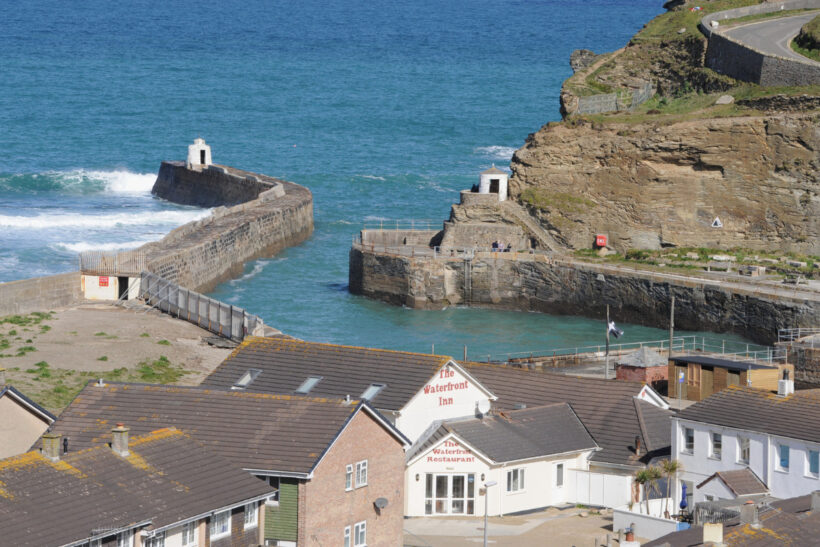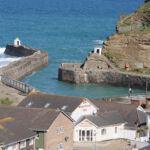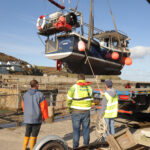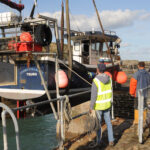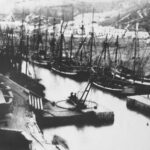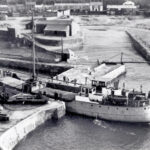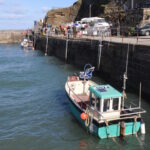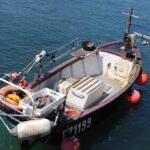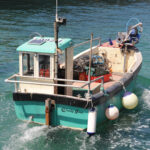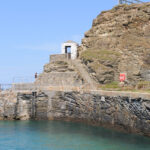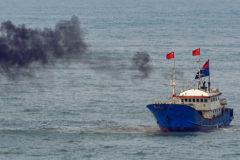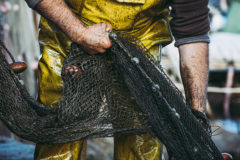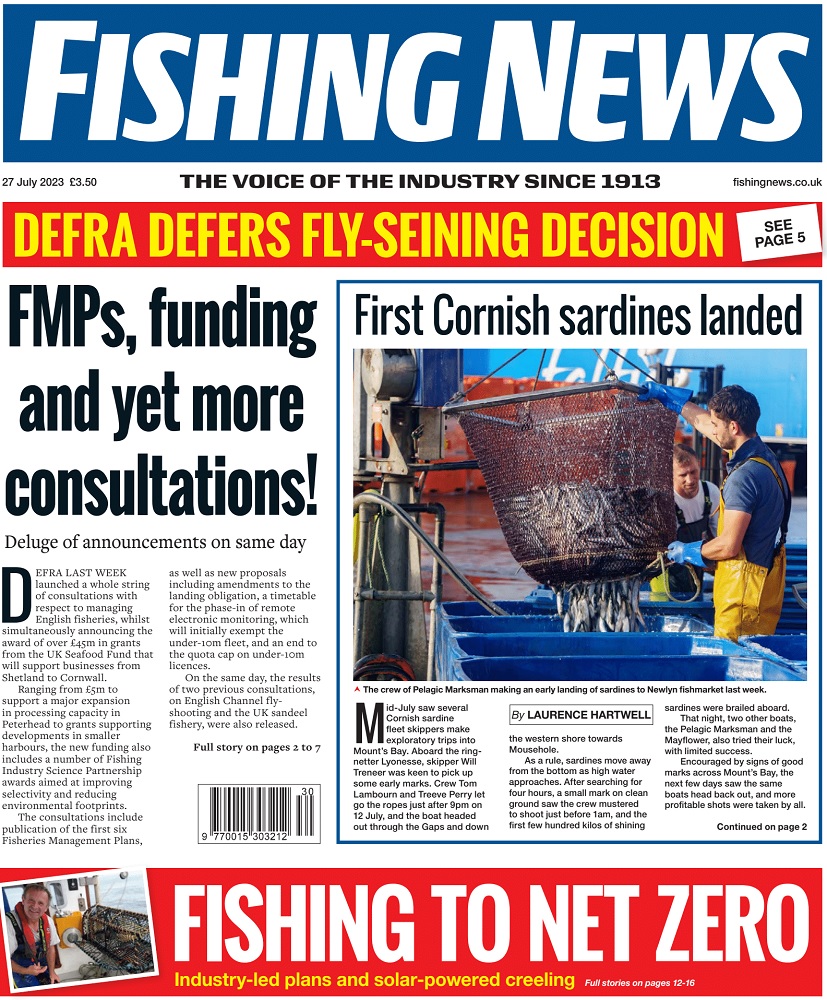The North Cornish cove of Portreath was once a busy shipping port. Today, its fishing fleet is growing – and its sights are set on year-round operation. Phil Lockley reports
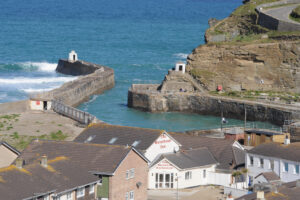
Portreath may look idyllic on a calm day – but as with all North Cornwall and Devon coves, it is subject to treacherous seas during the winter.
A stone’s throw from the once bustling Cornish industrial towns of Redruth and Camborne, the scenic cove of Portreath hosts six full-time inshore fishing vessels and over 20 leisure craft. At present, for five months of the year all the boats are lifted ashore for safety, but with a helping hand from Cornwall Council, Portreath may soon become an all-year-round port.
A proposed Harbour Revision Order would consolidate the statutory harbour powers of Bude, Newquay, Penryn, Penzance, Prince of Wales Pier in Falmouth, St Ives and Truro, allowing all seven harbours to be governed under the same legislation. It will encompass the Portreath, Portscatho and Portwrinkle Harbour Empowerment Order. A public consultation has already taken place.
In the Cornish language, Portreath (Porthtreth or Porth Treth) means ‘sandy cove’. The hamlet was first recorded in 1485, and ‘tin streaming’ from its river-valley was recorded in 1602. With its history set amid Cornish mining and associated industries, fishing – mainly for pilchards – played only a small part in its daily life. For several centuries, coal, tin, copper ore and arsenates were the currencies that kept Portreath in business.
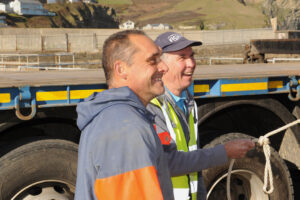
Skipper Chris Earl watches his Buccaneer B19 Cosmo’s Mariner being relaunched in April…
Sadly, a major industrial tradition ended on 6 March, 1998 with the closure of South Crofty tin mine near Redruth, just five miles from Portreath. Cornish people remain angry that the UK government closed the door on one of the most valuable resources that Britain has ever had.
Portreath’s skippers and crewmen make their living from one of the most demanding tidal ports in the West Country. The seas surrounding Portreath can often be treacherous. Like so many North Cornish and North Devon ports, poor weather restricts the number of days that vessels can fish – but this naturally imposed ‘conservation measure’ is reflected in the quantity of shellfish, bass and other coastal species landed there.
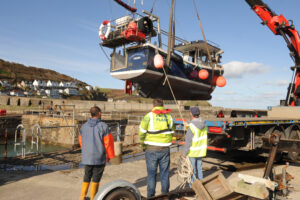
… after five months on the hard at Portreath – with the enactment of the Harbour Revision Order, the port may become a year-round haven, giving skippers more time at sea.
Each year a considerable number of holidaymakers descend on Portreath and experience the taste of Cornish shellfish and prime whitefish and the bustle of a small-scale fishing port – and in putting forward its Harbour Revision Order, Cornwall Council is aiming to preserve this for the future.
Colin Higgs, chairman of Portreath Harbour Association (PHA), applauds the move, but is calling for bodies like the MMO ‘to stop dragging their feet’ and enact the order as soon as possible.
He explained: “Fishing was never the mainstay of Portreath – it was more a shipping harbour.
“Being one of Cornwall’s earliest industrial ports, it was well-used by the ‘Welsh fleet’, a great flotilla of schooners, brigs and brigantines, mostly Cornish-owned and manned, which took tin and copper ore to South Wales and returned home with engine coal for the mines of Redruth and Camborne.
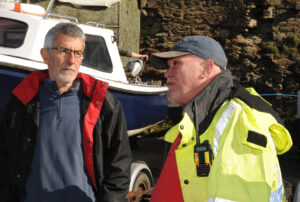
Colin Higgs, chairman of Portreath Harbour Association (right), is calling for the Harbour Revision Order to be enacted as soon as possible.
“The harbour that we have today began in 1760 to meet the demands of the developing ore industry in the Camborne and Redruth area. In 1846, the harbour was extended with the inner basin being constructed, and in the 1860s, the New Dock (commonly known as the Little Beach) was constructed.
“By the 1840s, Portreath was handling a staggering 700 shiploads per year, totalling 100,000t of ore.
“By the end of the 19th century this trade had seriously diminished, although imports of domestic coal, cement, slate and even potatoes continued until well after the Second World War.
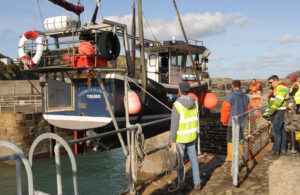
Cosmo’s Mariner goes back into the water.
“In 1980 the Beynon Shipping Company donated the harbour to Kerrier District Council, which has now been absorbed by Cornwall Council, from which the PHA leases the basins, slipway and quays – and along with the boat shed and the bait shed, leases the hardstanding.
We now have a small but important fishing industry, and Cornwall Council wishes to preserve it – but neither Cornwall Council nor the PHA can do anything to move ahead until the Harbour Revision Order is passed.
“This will protect the future of the port and allow it to be governed by a statutory body, with the power to enforce byelaws and to run the harbour with a good degree of governance.
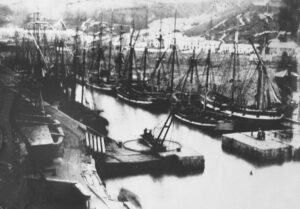
Old Portreath in the age of sail.
Not to be used for commercial gain.
“In simple terms, it will give Cornwall Council the power to dredge – to be responsible for dredging licensing – and to lay moorings, install aids to navigation, repair landing places and undertake groundworks and general maintenance.
“One of the reasons Cornwall Council Maritime Office is applying for the order is that all revenue from its harbours presently goes to Cornwall Council’s central fund, with very little being spent on the Cornish ports. The order will give the Maritime Office autonomy to invest in the harbours and improve conditions for boat owners.
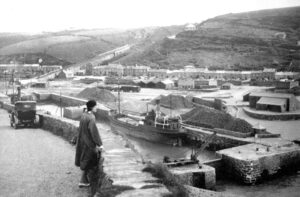
In the days of mining with the ‘Welsh Fleet’ as its main source of income, Portreath was a vibrant port.
Not to be used for commercial gain.
“The Maritime Office is preparing, with our support, a business plan to decide the best way to run Portreath in the future. Once the order has been granted, it is envisaged that PHA will become a stakeholder group advising the council on the wants and needs of the boat owners. The only foreseeable change is that the mooring fees and allocations will be paid to Truro Harbour Office and not the PHA.”
All of those involved in the harbour at Portreath are eager for the order to go ahead, but the bureaucratic process is taking its time, said Colin Higgs.
He explained: “Quite a while ago we were told by Cornwall Council that it was looking toward the order being in place by April this year. We made plans for PHA to cease operating as a port committee and become a steering group. When April came, Cornwall Council said that the passage of the order was being held up by government bodies such as the MMO, and it wasn’t expected to be in place until September.
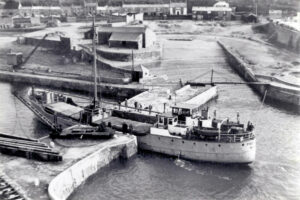
A coal ship being winched into the inner harbour.
“In reality, PHA members are unsure of when it will arrive, or if it will arrive at all. Together with other harbour users, we are concerned about the future of Portreath as a workable port.
“Cornwall Council is our landlord; we pay rent in advance and luckily, so far, we haven’t required any structural repairs to the harbour. Apparently, once the order is in place Cornwall Council may appoint a harbour master to deal with Portreath and several other ports. If the order doesn’t arrive soon, by the New Year PHA will have to elect its new committee and carry on as before – we do not want that to occur.
“If the order is enacted, it will become a statutory body under which byelaws can be introduced. As an example, we have a dreadful problem with mostly young people pushing their luck and dangerously jumping from the cliffs – often in front of Portreath boats on passage. The order will give us the right to ban such behaviour.
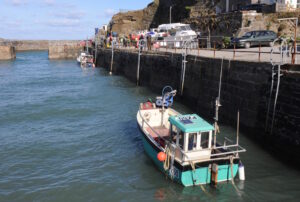
Six full-time boats currently work from Portreath.
“On the delay of the order, we are not pointing the finger directly at the MMO. The MMO has been, and remains, supportive to Portreath’s fishing fleet – it worked with Cornwall Council for Portreath fishermen to receive help from the Coastal Communities Fund to have a new fishermen’s shed erected, and for safety-at-sea refurbish the shed. The MMO made grant-aid available to have a landing crane fitted.
“We remain grateful – we just want the MMO to get going and pass the order.
“Over recent years Portreath’s fishing fleet has increased and we may have space for more boats – but not until the harbour is a more efficient and a safer place to work from.
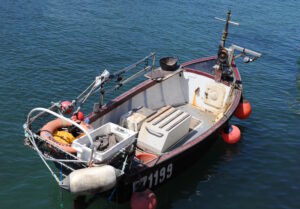
The Sea Goblin, skippered by Graeme Thomas, is a Cygnus Marine GM19 rigged for potting. A shallow-draught, tidal-harbour vessel aimed at lobster potting, it is also used for general-purpose line fishing and netting.
“At present, our six full-time boats are Megwyn (Skipper Ian Bramley), Boy Oliver II (Skipper Mark Clancey), Cosmo’s Mariner (Skipper Chris Earl), Nancy (Skipper Adam Garland), Sea Goblin (Skipper Graeme Thomas) and Wendy Jane (Skipper Matt Hopley).
“But currently Portreath is a difficult harbour to work from. It needs dredging – it has always been dredged in the past – and we would like the original baulks between the inner and outer basins to be replaced, to completely dissipate the swells. It wasn’t that long ago that the baulks were in use and were maintained.
“Cornwall Council support moves such as this. The order will give commercial boats at Portreath the opportunity to stay in operation all year – to make the port an all-year-round haven. It will benefit the town as well as the fishermen, because fish and shellfish landed here is important to so many nearby outlets.
“Portreath harbour and its fishing fleet have a lot of potential and Cornwall Council is doing its best, but until the order is in place, we are in limbo.”
This story was taken from the archives of Fishing News. For more up-to-date and in-depth reports on the UK and Irish commercial fishing sector, subscribe to Fishing News here or buy the latest single issue for just £3.30 here.



